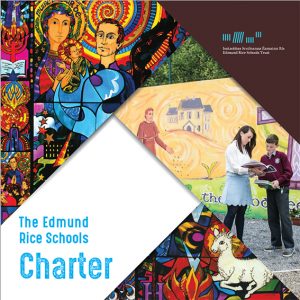Download the ERST Charter 2020
Download the Student-Friendly Version of the Charter (Flip Book)
Íoslósáil An Chairt (Flip Book)
Our Charter
The Charter sets out a framework designed to enable Catholic education in the Edmund Rice tradition to thrive and grow into the future. Each school community in our network is invited to put the Charter into practice, taking account of its own unique circumstances and traditions. The values in the Charter came from the schools. Through a process of reflection and sharing the school partners reached a consensus on what comprises the heart and soul of an Edmund Rice school.
Inspired by the Charter we respond to the needs of a changing world. We ensure that our schools continue to adapt and re define themselves, while remaining faithful to our mission and founding vision. Faithful to the church and inspired by Edmund Rice’s vision, we ensure the future of our schools as Christian communities of learning and teaching.
The five key elements of the Edmund Rice Schools Trust Charter are:
- Nurturing faith, Christian spirituality and Gospel-based values
- Promoting partnership
- Excelling in teaching and learning
- Creating a caring school community
- Inspiring transformational leadership.
Our schools promote equality of access and participation – in other words, children of any faith, or none, at every level of ability, of any nationality or ethnic grouping are all welcome in our schools. All of our schools are encouraged to recognise the uniqueness of each individual in caring communities where holistic development is nurtured.
As Trustees we appoint and nominate Boards of Management to run our schools. We help these Boards through training and a rolling programme of advice and support.
We also advise and support our Principals, Deputy Principals and staff through Conferences, Cluster meetings, training and induction courses.
Our Network promotes a strong sense of belonging and cooperation. We believe a great strength of our Network is this sense of belonging and consistently high levels of support and guidance given to our Principals and Boards of Management.
Our main object is to ensure and foster the advancement of education and to further the aims and purposes of Catholic education in the Edmund Rice tradition. To enable us to do this we encourage and expect all our community to engage with us, and to assist us to improve and expand our service to young people.
The Edmund Rice Schools Trust is a vibrant schools Network that is developing and supporting Catholic education throughout Ireland today.
Download our Guide for Parents
Edmund Rice was that rare combination – a creative visionary who was also immensely practical. From the humble beginnings of the first such school in Waterford in 1802, Edmund Rice Schools have played an important role in the history of Irish education for over two centuries. Today there are over a hundred of these schools in Ireland, and the Edmund Rice mission has extended to all five continents.
At the start of the new Millennium, the Christian Brothers founded by Blessed Edmund Rice decided to hand on responsibility for the schools to a group of lay people.
The Edmund Rice Schools Trust (ERST) was established to hold the schools in trust so that they may continue to provide Catholic education into the future for the people of Ireland. This pioneering decision marked the opening of a new and significant chapter in the history of the schools.
The process whereby lay people would take on responsibility for the schools was carefully planned during a long period of discernment. The lively and active participation of the students, staff, parents, trustees and boards of management of the schools over a four year period from 1999 to 2003 in an Identity Project was a vital part of this preparatory phase. Through reflection, and sharing, the school partners sought to reach consensus on what comprises the heart and soul of an Edmund Rice School.
Edmund Rice schools cater for young people from a diverse range of backgrounds and have been quick to respond to the emerging needs of students and communities. The educational approach in the schools is neither functional nor utilitarian, but subscribes to the holistic vision expressed in the following five key elements:
- Nurturing faith, Christian spirituality and Gospel-based values;
- Promoting partnership;
- Excelling in teaching and learning;
- Creating a caring school community;
- Inspiring transformational leadership.
1. Nurturing faith, Christian spirituality and Gospel-based values;
An Edmund Rice School:
- Is faithful to the life of Jesus Christ.
- Develops the whole person.
- Promotes a distinctive spirituality
- Celebrates diversity and values difference
- Fosters a living faith through working for social and ecological justice.
- Celebrates Mary as model of faithfulness.
- Prioritises resources.
2. Promoting Partnership
An Edmund Rice School:
- Recognises the value of partnership.
- Works in partnership with parents/guardians.
- Seeks to build community
- Embodies the principles of inclusiveness.
- Respects the earth.
- Fosters a sense of belong to parish.
- Promotes networking.
3. Excelling in Teaching
An Edmund Rice School:
- Focuses on purposeful teaching and learning.
- Nurtures the holistic development of students.
- Recognises the uniqueness of every student.
- Promotes personal and professional development.
- Raises awareness of the interconnectedness of the world in which we live.
- Uses information technology with critical awareness.
- Responds to a changing world.
4. Creating Community
Creating a caring school community an Edmund Rice School:
- Develops a sense of community.
- Identifies and serves the needs of the students.
- Promotes care and responsibility.
- Works for social justice.
- Fosters care for the environment.
- Seeks to provide a safe and respectful working environment.
5. Inspiring Leadership
Inspiring transformational leadership an Edmund Rice School:
- Fosters visionary leadership.
- Encourages ownership of the vision.
- Shares leadership roles.
- Encourages the active participation of parent/guardians.
- Welcomes innovative leadership of teachers.
- Elicits leadership and responsibility in students.
- Promotes spiritual and moral values.
- Inspires courage and confidence.
- Encourages a work ethos and innovation.

